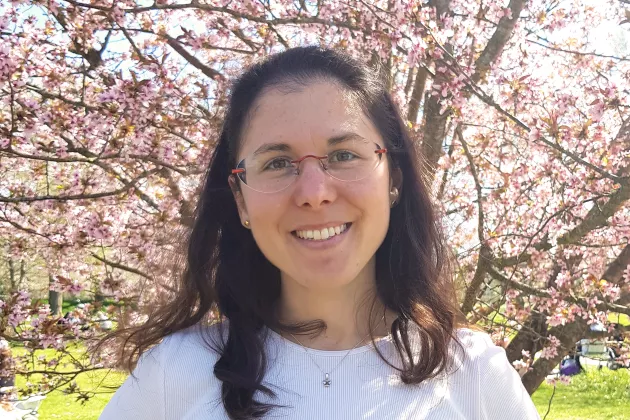What is your thesis about?
"Currently the best model for the description of fundamental particles and their interactions within particle physics, is the Standard Model. While it is a remarkably successful theory, it still needs to be modified or extended, in order to capture some phenomena in nature currently not described. Some of these phenomena are hopefully to be detected at particle facilities in the near future. For the accurate and efficient measurement of any physics deviating from the Standard Model, we need a very precise handle of the predictions of this background theory. My thesis contributes to the field of phenomenology – which is the bridge between theory and experiment – by investigating high precision predictions for some key processes and observables for high-energy particle facilities such as the Large Hadron Collider at CERN."
Why did you choose this particular topic?
"The field of particle physics has always been an interesting topic for me, since my first encounter with it during my undergraduate studies. As a master student working in theoretical low-energy particle physics, I was offered this position in Lund as a PhD student with a choice to continue in low-energy physics or to work within high-energy phenomena. To fill my missing gap in knowledge in the high-energy region, I took the challenge of a slightly new field. In hindsight, I am very happy with my choice, as this field of science and particle physics in particular, is full of unexplored paths and a long list of to-dos’. While it is not directly related to the exciting new physics searches, it is a stable foundation for finding these at future facilities."
What is the most important result from your thesis?
"My thesis consists of multiple distinct projects, each with its own significant impact of the corresponding process or observable. Perhaps the project with hopefully the most impact, is the project in which a new approach for computing processes with large number of strongly interacting particles, called multi-jet events, is presented. Once the implementation will be complete in a future work, this will allow for an efficient way of computing multi-jet events, which are the dominant background events at the Large Hadron Collider, for Standard Model theory predictions."
What do you hope your thesis will lead to?
"Regarding the multi-jet events, the work in the thesis will hopefully lead to an improved and efficient way of computing these events, which will be an important tool for both theory and experimental groups performing background simulations. Secondly, one of the other projects in the thesis regarding the decay coefficients for charged boson production and decay, is an important first step towards a more accurate measurement of the W-boson mass measurement at the Large Hadron Collider, which is one of the parameters of the Standard Model with most tension within the community."
What will you do when you have finished your dissertation?
"I received the international postdoc grant from the Swedish Research Council, for a project in which the multi-jet process project from my thesis will be extended by implementing the approach, and developing the efficiency and accuracy of the implementation in various ways. This project is within an international framework, in which 2/3 of the total 3 years will be spent abroad at the host universities of ELTE (Budapest) and UCLouvain (Brussels), and the remaining time at the administrating organization, Uppsala University. The collaboration with the Lund University group will also continue through this project."
Why is it important to do research?
Science and research are curious subjects. For most people working in this field, the direct impact of their work on society will probably not be noticed. However, each one’s contribution is essential for building the large puzzle of knowledge of humanity. Some may lay more puzzle pieces than others, and some may lay the final puzzle piece which makes the picture complete. But all puzzle pieces contribute nonetheless equally to the entire picture. And once the picture is finalized, humanity can move forward in whatever direction is needed at the specific time of finalization of the puzzle. Therefore, perhaps we cannot today grasp all the implications research can have on society, but it is our duty to lay the puzzle for future generations to harvest the fruit of the work of many."
Dissertation
For the degree of doctor in Theoretical Physics, Timea Vitos has composed an academic thesis entitled:
"Precision Standard Model Phenomenology for High Energy Processes"
Timea Vitos' thesis is available at the Lund University Research Portal
Opponent appointed by the Faculty is Associate Professor Alessandro Vicini, Department of Physics, University of Milan, Italy.
Timea Vitos defends her thesis on June 16, more information can be found in our calendar.


